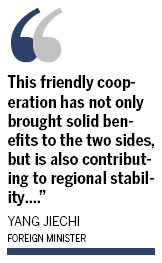Top News
FM deflects Clinton's comments on Pacific Islands
Updated: 2011-03-04 10:42
By Tan Yingzi and Ma Liyao (China Daily)
EIJING / WASHINGTON - After Hillary Clinton, the United States secretary of state, warned that the US is losing its grip on global influence as Beijing looks to develop ties with the Pacific Islands, Foreign Minister Yang Jiechi looked to press on the gas, calling China's relationship with the Pacific region the "common will of the two sides".
|
|
Clinton made the strong comments to the Senate Foreign Relations Committee on Wednesday in an attempt to persuade the US Congress from cutting its diplomatic budget. She cautioned that: "We are in a competition for influence with China."
Her statement prompted China's Foreign Ministry to say that "relations between China and the island countries have been developing well in recent years".
Yang said in a fax to China Daily that China insists on offering genuine and selfless help to the Pacific Islands to help them independently develop.
Trade between China and the Pacific Islands, which has an abundance of natural resources, has risen over the past decade, from $180 million in 2001 to $1.5 billion in 2010, according to a report from Australia's ANZ Bank. Investments in infrastructure, technology and agriculture have also increased.
"This friendly cooperation has not only brought solid benefits to the two sides, but is also contributing to regional stability, development and prosperity," according to Yang's faxed statement.
Clinton's comments are likely to irritate China, which pushed for trust and cooperative trade during President Hu Jintao's high-profile visit to the US in January. During the visit, Clinton said she welcomed China as a rising power.
At the committee hearing Wednesday, she cited a $15 billion natural gas project in Papua New Guinea by US oil giant Exxon Mobil Corp. According to the Associated Press, Clinton said China was jockeying for influence in the region and seeing how it could "come in behind us".
"If anybody thinks that our retreating on these issues is somehow going to be irrelevant to the maintenance of our leadership in a world where we are competing with China, where we are competing with Iran, that is a mistaken notion," she said.
Comments on "competition with China in the region" were mainly made due to domestic political concerns, Chinese experts said.
Ni Feng, at the Chinese Academy of Social Sciences, said the US government is facing severe budget cuts since Republicans took over the House of Representatives at the midterm elections. Republicans have proposed a 16-percent cut to spending on diplomacy and foreign assistance to slash the federal deficit.
"Military spending is unlikely to be affected and other departments are facing financial tightening," Ni said. "Clinton was trying to keep the money as much as possible by throwing words at China."
Since last year, China and the US have clashed over territorial issues as Washington steps up efforts to engage with the Pacific Islands.
In July, Clinton waded into the South China Sea disputes by telling a security forum in Vietnam that a peaceful resolution of the disputes over the Nansha and the Xisha islands was an American national interest. She also suggested a multilateral solution to the dispute. China, however, has disputes in the South China Sea with Vietnam, Malaysia, Brunei and the Philippines.
Beijing objected strongly to Clinton's comments in July, saying Washington was interfering in a regional issue.
During Clinton's Asia trip, she also said China applies "a zero-sum calculation to our relationship, so whenever one of us succeeds, the other must fail".
At least one American analyst said China-US relations will worsen this year because of competition in the Asia-Pacific region.
Kenneth Lieberthal, director of the John L. Thornton China Center at the Brookings Institution, said that one of the major problems between China and the US is that the two countries do not have enough trust for each other.
The first step is to recognize that, he said. The two governments must then need to keep addressing the lack of trust to establish better communication.
"Over time, trust is the product of that," he told China Daily.
China Daily
Specials

NPC & CPPCC sessions
Lawmakers and political advisers gather in Beijing to discuss major issues.

Self-made aircraft
An automobile mechanic in Northeast China made a test flight of his self-made aircraft which cost about US$395.

Venetian Carnival
Masked revellers celebrate in Saint Mark's Square in Venice.
